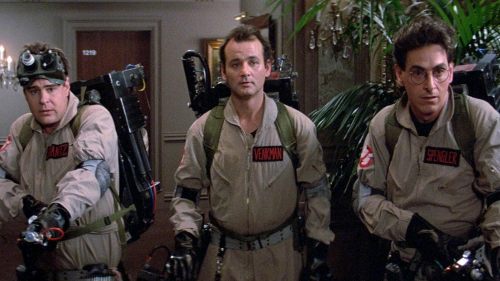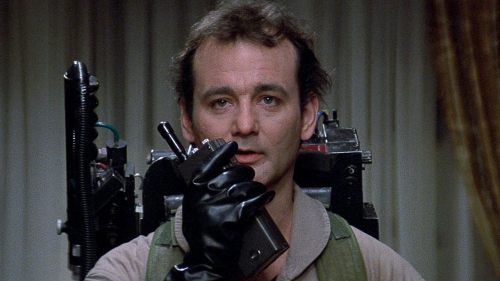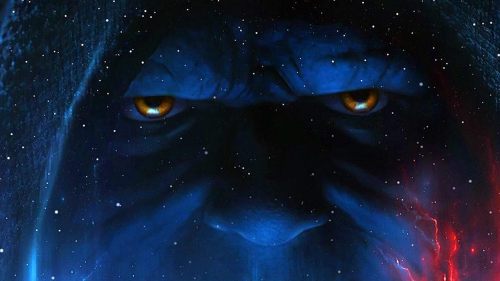The Ghostbros Ruined My Childhood
I was ten years old when Ghostbusters came out in 1984, and it hit me hard. I loved that movie, which melded two of my geeky kid interests - horror movies and trying to stay up late to watch Saturday Night Live. Ghostbusters II was one of my earlier experiences with movie disappointment (it built on my foundational experiences, Howard the Duck and Dune), but I still loved the Ghostbusters. I played the role playing game, which took the core supernatural concepts very seriously, and which allowed you to open your own Ghostbusters franchise. But I also watched the cartoon, which betrayed most of the spirit of the original characters and yet still worked (I actually preferred the cartoon with Tracy the Gorilla, if only because I had watched the live action Ghost Busters as a little kid and loved it). Over the past few years I have been lucky enough to see the original film on the big screen a number of times, and each time I see it I'm reminded of the special alchemical magic that made this movie - which should never have worked - become a classic.
Ghostbusters has always been very important to me, but after the past few months it feels tainted. And not because of the reboot, which was fine and not only didn't hurt the original, it homaged it too much, but because of the revelation that Ghostbusters fans are, in a word, monsters. It's going to take me some time to surgically remove the experiences of the last few months - and the camel-breaking straw that was the deluge of racist harrassment aimed at reboot star Leslie Jones on Twitter yesterday - from the original film.
For the longest time I thought that Ghostbusters superfans were charmingly harmless. They tended, in my experience, to be chubby, goateed 30something dudes, the kinds of guys who felt comfortable dressing up in jumpsuits because they flattered their figures. They seemed like real middle of the road people, average nerds who liked what they liked and didn't want to discuss the politics or meanings behind the properties they enjoyed. They probably never thought about the meaning of having the EPA be the bad guys of the original movie. The kind of guys who held their meet-ups at Chili's, you know? Just average white dudes.
Maybe that's why the revelation that so many of them are sputtering, red-faced misogynerds is so upsetting. The most harmless fanbase I could have imagined ended up being this toxic, this hateful. What does this say about the souls of millions of other regular, middle of the road American white men? If guys who worshipped at the altar of an ironic, detached, smugly intelligent comedy were this vicious, what about their non-nerd co-workers? Maybe it's just my own prejudices showing, but I had always seen the Ghostbusters fanbase as the least nerdy of the fanbases, sharing (with Star Wars fans) the most overlap on the Venn diagram that depicted regular people and geeks.
In retrospect this speaks to Ghostbusters' unique place in the history of fandom. It was created by the first generation that were 'fans;' the Baby Boomers were the first people to keep in touch with the 'junk' from their youth, the scifi and horror and comedy stuff that many saw as disposable. Fandom had existed before the Boomers, but it began to go mainstream with them as they dragged nostalgia into the spotlight of American culture. They were the first generation to never quite put away their childish things, and they started the path that led to where we are today.
Ghostbusters' spot in that evolution of fandom was hard for me to see until now, but the Ghostbros have shed some light on it. It's a mainstream comedy that took its supernatural and scifi elements mostly seriously; the proton packs and ghost traps aren't hard science but they're written and designed like working items. The supernatural stuff can be funny but is never played for laughs; this isn't Mel Brooks' Ghost Story. If you removed the comedy from Ghostbusters you would have a mostly functional scifi-supernatural story. If Star Wars blew the doors open on bringing genre to the mainstream, Ghostbusters was one of the many small steps along the way to genre's total mainstream domination today. It was one of many small steps that brought once-obscure genre concepts and imagery to the mall crowds, the people who today are the engine getting Marvel superhero movies to one billion dollars worldwide.
But that journey has been a rough one, a trip that has been full of culture clashes. The Ghostbusters reboot is the latest in these culture clashes, and the clash is almost always the same: Girls are getting into my toys. With Ghostbusters it's way more explicit, but it's been the undercurrent all along. There is, of course, also resistance to black and gay people getting in on geek stuff, but the main problem for the Ghostbros is the proliferation of women.
I could talk about the many psychological factors that play into this - believe me, as somoene who was roundly ridiculed in middle and high school for my geeky interests, and who knew better than to share the depth of my comic book collection with any girl I thought was cute, getting used to women en masse in fandom took a second. All of my preconceived ideas of what my 'nerd' identity meant were suddenly out the window, and you kind of have to readjust. But you readjust; do I wish this stuff was still more niche? Sure, but that doesn't mean I want fewer women, minorities or LGBTQ people involved. I just want fewer normals, you know? But these psychological factors are, in 2016, total horseshit. The world has changed, guys, get used to it. Live in it. Stop harassing it on Twitter.
So while Ghostbusters was a small step in the evolution of geeky interests into mainstream interests, the Ghostbros feel like a major symptom of the culture clashes that are eating away at fandom. I want to believe that this latest tantrum from the misogynerds represents the death throes of an old way of thinking, but I look at the state of American race and gender relations and I can't be so positive. I still see guys on Facebook complaining about feminism, and they're doing it in a world where we can't even get an Equal Rights Amendment passed.
I worry that the Ghostbros are not the sign of a change in the fandom I grew up with but rather a sign of its eventual death. As the nerdy stuff we love gets more and more mainstream, more and more mainstream people get into that stuff, and they bring with them all the garbage that makes them 'normals' in the first place. To be a nerd is, on some level, to have an affinity for the downtrodden and the outcast, and staunch defenses of the middle class white male status quo feel profoundly not-nerdy to me. I'm not claiming that misogyny is new to nerdom, but the tenor of it feels different today than it did in the 80s. Where weird nerd attitudes towards women were once defense mechanisms for people who felt marginalized and rejected they now feel like defense mechanisms for white men who feel that the marginalized and rejected are after them. Where the worst elements of fandom used to be about outsiders protecting themselves from the mainstream it is now about the mainstream keeping down the outsiders. It's a complete inversion, and I hate it.
Fandom has changed dramatically in the last ten years, and it feels like having your old neighborhood change around you. At first you think that the new shops and new residents are pretty cool, that things are getting better, but then you wake up one day and find yourself a stranger in a strange land. This street is where you grew up, but you don't recognize any of the houses. The community you had is gone. I feel like many of the nerdy properties that I grew up with, that gave me comfort in hard times and that inspired me to take chances in my life, have been coopted by people I hate. And I find that all the cool people - the real nerds, the sensitive kids, the outcasts and weirdos and misfits - have moved to a new neighborhood where I don't feel as comfortable. As the stuff I loved all my life has gone mainstream the real nerds have found ever more obscure niches to set up camp, places where they can keep being unique and obsessive without having to share space with the assholes who conquered Gen X fandom. I'm kind of jealous, and sort of wish I could get into Steven Universe, but them's the breaks.
Perhaps the strangest thing about this particular misogynistic, hateful dudebro outrage is that it's happening to a Paul Feig movie. Feig is the guy whose experience as a young nerd I identify with the most; while we talk about Judd Apatow in relation to Freaks and Geeks, anyone who read Feig's comedic memoirs will see so much of him on that show. Freaks and Geeks takes place a decade before my own peak geek years, but it reflects so much of my own life, and it's filled with the sort of kindness that comes from being a true outcast (I think Feig learned better lessons from his childhood than I did, to be honest). Nobody represents the best of Gen X fandom like Paul Feig, and now his latest movie is being assailed by the worst of it. By the exact kind of people who would have called Sam Weir 'queer' and shoved him into a locker. What do you think Neal Schweiber or Bill Haverchuck, early convention-attending dorks, would make of this modern face of fandom? I suspect they would hate it.
So to the Ghostbros: you've ruined my childhood. You represent all the forces that have soured the things that I love, the regressive elements that have colonized progressive and fun properties, characters and stories. You represent the triumph of mainstream, middle class white values over outsider thinking, interesting perspectives and system-challenging ideas. You are the death of my community.
And to the younger nerds, the new generation chasing their own interests: keep being odd, and queer, and outrageous. Pay no mind to old dudes like me who don't get what you're into. Keep fandom weird. And beware 30something white guys in cargo shorts.



